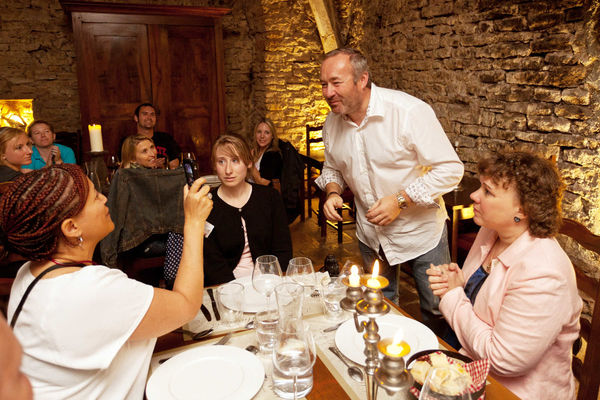Tips for Creative Communication While Traveling

By Rick Steves
Communicating can be a struggle when you encounter someone in your travels with whom you share no real language in common — but it can also be a fun chance to challenge your creativity. Most people recognize and appreciate any sincere attempt to connect with them, and sometimes your effort alone can spark one of those special moments when we recognize each other's shared humanity.
Consider this profound conversation I had with a cobbler in Sicily:
"Spaghetti," I said, with a very saucy Italian accent.
"Marilyn Monroe," was the old man's reply.
"Mamma mia!" I said, tossing my hands and head into the air.
"Yes, no, one, two, tree," he returned, slowly and proudly.
By now we'd grown fond of each other, and I whispered, secretively, "Molto buono, ravioli."
He spat, "Be sexy, drink Pepsi!"
Waving good-bye, I hollered, "No problema."
"Ciao," he said, smiling.
Risk looking goofy. Even with no common language, rudimentary communication is easy. Butcher the language if you must, but communicate. I'll never forget the clerk in the French post office who — long before email or Twitter — flapped her arms and asked, "Tweet, tweet, tweet?" I understood immediately, answered with a nod, and she gave me the airmail stamps I needed. At the risk of getting birdseed, I communicated successfully. If you're hungry, clutch your stomach and growl. If you want milk, "moo" and pull two imaginary udders. If the liquor was too strong, simulate an atomic explosion starting from your stomach and mushrooming to your head.
Be melodramatic. Exaggerate the native accent. In France, you'll communicate more effectively (and have more fun) by sounding less like an American and more like Inspector Clouseau. The locals won't be insulted; they'll be impressed. Use whatever French you know. Even English spoken with a sexy French accent makes more sense to the French ear. In Italy, be melodic and exuberant, and wave those hands. Go ahead, try it: Mamma mia! No. Do it again. MAMMA MIA! You've got to be uninhibited. Self-consciousness kills communication.
Make logical leaps. Most major European languages are related, coming from (or at least being influenced by) Latin. Knowing that, words become more meaningful. The French word for Monday (our "day of the moon") is lundi (lunar day). The Germans say the same thing — Montag. Sonne is sun, so Sonntag is Sunday. If buon giorno means good day, zuppa del giorno is soup of the day. If Tiergarten is zoo (literally "animal garden") in German, then Stinktier is a stinky animal — a skunk — and Kindergarten is children's garden. Think of Vater, Mutter, trink, gross, gut, rapide, grand, económico, and delicioso, and you can comprender mucho.
Many letters travel predictable courses (determined by the physical way a sound is made) as related languages drift apart over the centuries. For instance, p often becomes v or b in the neighboring country's language. Italian menus always have a charge for coperto — a "cover" charge.
Read and listen. Read time schedules, posters, multilingual signs (and graffiti) in bathrooms, and newspaper headlines. Develop your ear for foreign languages by tuning in to the other languages on a multilingual tour. It's a puzzle. The more you play, the better you get.
Many European websites offer English-language versions (usually accessed by clicking on a tiny British or American flag or the abbreviation "EN"). For web pages that are available only in the native language, a website translator is helpful.
Some browsers detect when a web page is in a foreign language and ask if you want it to be translated to English — or may even do so automatically. While less than perfect, this feature can open a whole new world of local information for travelers. For instance, you might find more interesting local eateries in Munich if you use a browser translator to read restaurant reviews written by German users.
A phone or notepad can work wonders. Words and numbers are much easier to understand when they're written rather than spoken (especially if you mispronounce them). My back-pocket notepad is my constant travel buddy. To repeatedly communicate something difficult and important (such as medical instructions, "I'm a strict vegetarian," "boiled water," "well-done meat," "your finest ice cream," or "I am rich and single"), use your phone or a notepad to show the word in the local language. You can enter any text into Google Translate for an instant translation; click the speaker icon to hear the foreign words spoken aloud.
Assume you understand and go with your educated guess. My master key to communication is to treat most problems as multiple-choice questions, make an educated guess at the meaning, and proceed confidently as if I understand. At the breakfast table, the waitress asks me a question. I don't understand a word she says, but I tell her my room number. Faking it like this applies to rudimentary things like instructions on customs forms, museum hours, and menus. With this approach I find that 80 percent of the time I'm correct. Half of the time that I'm wrong, I never know it, so it doesn't really matter. And 10 percent of the time, I really blow it. My trip becomes easier — and occasionally much more interesting.

